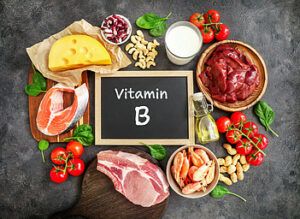Vitamin B Complex Benefits: A Crucial Factor for Energy Production, Brain Function, Heart Health, and More
The B complex vitamins are of incredibly high importance for our overall health and well-being.
incredibly high importance for our overall health and well-being.
Including foods that are high in all of the B complex vitamins as part of one’s balanced whole food diet is of key necessity to ensure optimal health.
Here we will explore vitamin B complex benefits, their primary functions in our body, and some of the foods that are highest in this critically significant group of vitamins.
What are the B Complex Vitamins?
The B complex vitamins are a group of water-soluble vitamins that are responsible for a myriad of different functions in the human body.
Water soluble means that they are dissolved in water and the body does not store them, so they must be ingested on a regular basis.
B vitamins are carried throughout the body through the bloodstream, with any excesses being excreted via the urine.
They include:
- Thiamine (vitamin B1)
- Riboflavin (vitamin B2)
- Niacin (vitamin B3)
- Pantothenic Acid (vitamin B5)
- Pyridoxine (vitamin B6)
- Biotin (vitamin B7)
- Folate (vitamin B9)
- Cobalamin (vitamin B12)
Primary Physiological Functions and Benefits
Each of the B vitamins performs various functions unique to that specific vitamin, while also working together in various ways.
A function that is shared by all of the B vitamins is taking carbohydrates and other nutrients found in the food that you eat and converting them into usable energy throughout the whole body. This energy is used in a myriad of ways such as in your brain and nervous system.
- Thiamine (vitamin B1)
Thiamine is used to metabolize sugar, and to keep the heart, muscles, and nerves functioning properly.
- Riboflavin (vitamin B2)
Riboflavin is needed for proper detoxification and is required for optimal vision and for building tissues throughout the body. 
This vitamin is used to maintain liver health and to help the adrenal glands produce hormones. The adrenal glands are a key part of your endocrine/hormone system which involves the stress response, sex hormone production, and more.
Riboflavin is also used for fetal development and to help maintain proper cellular function.
- Niacin (vitamin B3)
Niacin is needed for cell growth, DNA formation and repair, and also has antioxidant effects in the body.
It also helps improve circulation, is used to produce hormones from the adrenal glands, and has anti-inflammatory effects.
- Pantothenic Acid (vitamin B5)
Pantothenic acid is very important for the proper functioning of the adrenal glands as well. It is henceforth involved in the stress response and the production of sex hormones.
Vitamin B5 is also needed for the breakdown of fats, maintaining a healthy digestive tract, and for making red blood cells which carry oxygen throughout your body.
- Pyridoxine (vitamin B6)

Vitamin B6 is very important for the proper functioning of the central nervous system. It is also needed for the creation of neurotransmitters such as dopamine and serotonin which play vital roles in the body such as maintaining optimal brain function and mental & emotional well-being.
It is also a significant part of immune function in helping the body make antibodies against pathogenic organisms.
It helps to maintain optimal nerve function, produce hemoglobin (the iron containing protein in red blood cells that helps to deliver oxygen through the body), to break down proteins, and to maintain blood sugar balance.
- Biotin (vitamin B7)
Biotin is most well known for being required for optimal hair, skin, and nail health. It is also needed to maintain blood sugar balance, for optimal brain and heart function, and has anti-inflammatory effects in the body.
- Folate (vitamin B9)
Folate is very important during pregnancy, particular early pregnancy for the proper development of the brain and spine. It is also key for the development of red blood cells and for healthy cellular function and growth.
Folate plays a key role in a fundamental biochemical process called methylation, which involves detoxification, neurotransmitter metabolism, hormone balance, and much much more.
- Cobalamin (vitamin B12)
Vitamin B12 is also needed for red blood cell production, as it works closely with folate in this way. It is also needed to make DNA, maintain brain function, and for nerve cell health.
Foods High In B Vitamins
While there are particular foods that are higher in a specific B vitamin, many foods contain high amounts of multiple B vitamins so you will see the same food repeated a few times here.
 Salmon and chicken are excellent examples of this, as these foods are a great source of almost all of the B vitamins.
Salmon and chicken are excellent examples of this, as these foods are a great source of almost all of the B vitamins.
- Thiamine (vitamin B1)
Salmon, chicken, tuna, spinach, brown rice, lentils/other beans, nuts & seeds, asparagus, kale, green peas
- Riboflavin (vitamin B2)
Salmon, beef, chicken, organ meats, eggs, avocado, spinach, mushrooms, asparagus, broccoli, turnip greens
- Niacin (vitamin B3)
Salmon, beef, chicken, organ meats, tuna, turkey, anchovies, avocado, brown rice, lentils/other beans, mushrooms, asparagus
- Pantothenic Acid (vitamin B5)

Salmon, beef, chicken, eggs, avocado, brown rice, chickpeas, lentils/other beans, mushrooms, sunflower seeds
- Pyridoxine (vitamin B6)
Salmon, chicken, beef, turkey, brown rice, avocado, spinach, lentils/other beans
- Biotin (vitamin B7)
Salmon, eggs, organ meats, beans, nuts & seeds (particularly sunflower seeds), mushrooms, broccoli, avocado
- Folate (vitamin B9)
Leafy greens such as spinach & kale, brussels sprouts, green peas, avocado, lentils/other beans (particularly chickpeas & kidney beans), asparagus
Making green juices such as this one are excellent ways to incorporate folate-rich foods into your daily eating plan.
- Cobalamin (vitamin B12)
Salmon, beef, chicken, organ meats, tuna, trout, eggs
Clearly, a lot of the foods that are high in B complex vitamins, specifically vitamin B12, are not often included in vegetarian or vegan diets. Supplementing is usually required for these types of eating plans to ensure that optimal levels are being met.

Possible Symptoms of B Vitamin Deficiency
The symptoms of a possible B vitamin deficiency can be varied because of how many different physiological functions and systems are impacted by these vitamins, but there are a number of telling signs.
These can commonly include:
- Anemia
Anemia, or a low red blood cell count, can indicate a deficiency in vitamins B9 and B12 since these vitamins are required to help make red blood cells and to help them mature. A deficiency in vitamin B5 can also contribute to low red blood cell production.
If deficient in these vitamins, red blood cell production will decline and these cells will remain too large, as they decrease in size as they mature. This is called megaloblastic anemia.
A deficiency in vitamin B6 can also result in low hemoglobin levels, which causes anemia as well.
Symptoms of anemia overall include fatigue, shortness of breath, hair loss, pale skin, heart palpitations, dizziness, and cold hands & feet.
of breath, hair loss, pale skin, heart palpitations, dizziness, and cold hands & feet.
- Hair loss, weak nails, skin issues
This can indicate a deficiency in vitamin B7, biotin, because this vitamin is involved in maintaining the health of these tissues.
- Fatigue
Fatigue can be a symptom of a deficiency in all of the B vitamins, mainly because each one is responsible for helping to convert food into energy. Fatigue can also result from anemia, as explained above.
- Depression and/or anxiety
Because so many of the B vitamins are involved in maintaining brain function, creating neurotransmitters, and helping to manage the adrenal gland stress response, a deficiency in any number of B vitamins can lead to depression and/or anxiety.
In Closing…
As we’ve explored here, the B complex vitamins are of great significance to the optimal functioning of our body. They are responsible for many important physiological functions including energy production, brain function, cellular health, heart health, and more.
Ensuring that your diet includes plenty of foods that are high in B vitamins is a key step in achieving and maintaining health and wellness.
REFERENCES